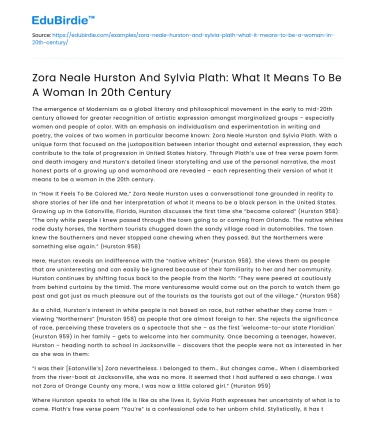The emergence of Modernism as a global literary and philosophical movement in the early to mid-20th century allowed for greater recognition of artistic expression amongst marginalized groups – especially women and people of color. With an emphasis on individualism and experimentation in writing and poetry, the voices of two women in particular became known: Zora Neale Hurston and Sylvia Plath. With a unique form that focused on the juxtaposition between interior thought and external expression, they each contribute to the tale of progression in United States history. Through Plath’s use of free verse poem form and death imagery and Hurston’s detailed linear storytelling and use of the personal narrative, the most honest parts of a growing up and womanhood are revealed – each representing their version of what it means to be a woman in the 20th century.
In “How It Feels To Be Colored Me,” Zora Neale Hurston uses a conversational tone grounded in reality to share stories of her life and her interpretation of what it means to be a black person in the United States. Growing up in the Eatonville, Florida, Hurston discusses the first time she “became colored” (Hurston 958): “The only white people I knew passed through the town going to or coming from Orlando. The native whites rode dusty horses, the Northern tourists chugged down the sandy village road in automobiles. The town knew the Southerners and never stopped cane chewing when they passed. But the Northerners were something else again.” (Hurston 958)
Save your time!
We can take care of your essay
- Proper editing and formatting
- Free revision, title page, and bibliography
- Flexible prices and money-back guarantee
Here, Hurston reveals an indifference with the “native whites” (Hurston 958). She views them as people that are uninteresting and can easily be ignored because of their familiarity to her and her community. Hurston continues by shifting focus back to the people from the North: “They were peered at cautiously from behind curtains by the timid. The more venturesome would come out on the porch to watch them go past and got just as much pleasure out of the tourists as the tourists got out of the village.” (Hurston 958)
As a child, Hurston’s interest in white people is not based on race, but rather whether they come from – viewing “Northerners” (Hurston 958) as people that are almost foreign to her. She rejects the significance of race, perceiving these travelers as a spectacle that she – as the first 'welcome-to-our state Floridian' (Hurston 959) in her family – gets to welcome into her community. Once becoming a teenager, however, Hurston – heading north to school in Jacksonville – discovers that the people were not as interested in her as she was in them:
“I was their [Eatonville’s] Zora nevertheless. I belonged to them… But changes came… When I disembarked from the river-boat at Jacksonville, she was no more. It seemed that I had suffered a sea change. I was not Zora of Orange County any more, I was now a little colored girl.” (Hurston 959)
Where Hurston speaks to what life is like as she lives it, Sylvia Plath expresses her uncertainty of what is to come. Plath’s free verse poem “You’re” is a confessional ode to her unborn child. Stylistically, it has the feeling of a private letter or diary page – a technique that allows the reader to see into the inner workings of Plath’s mind. The first stanza begins by speaking to the joy and anxious anticipation Plath feels while waiting:
“Clownlike, happiest on your hands,
Feet to the stars, and moon-skulled,
Gilled like a fish.” (Lines 1-3)
The use of a specific word such as “clownlike” (Line 1) speaks to the happiness and innocent quality that all children possess at first. The phrase “gilled like a fish” (Line 3) is also particularly powerful. It expresses how base and undeveloped the potential life is – the uncertainty being the source of Plath’s anxieties and anticipation. Plath continues this thought, elaborating further on her feeling of uncertainty:
“Vague as fog and looked for like mail.
Farther off than Australia.” (Lines 10-11)
Plath’s use of the simile “vague as fog” (Line 10) creates the sense of barrier she feels between her and her child. While fog itself does not erase detail, it does muddle the image of something that a person is trying to view. As an adult, Plath has already experienced loss, pain, and struggle unique to her experience as a woman in a male-dominated society. Here, Plath conveys her longing to know what the fetus will be like – a clear indication of her desire to protect her child and prepare them for the world they will soon enter. Importantly, in the final lines of her poem, Plath describes the newness and innocence she hopes to protect from disappoint and disillusionment:
“Right, like a well-done sum.
A clean slate, with your own face on.” (Lines 17-18)
In her sign-off, Plath expresses her belief that the next generation is the best of humanity. As “a clean slate” (Line 18), her child represents a fresh start and hope for a better future.






 Stuck on your essay?
Stuck on your essay?

